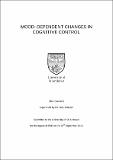Files in this item
Mood-dependent changes in cognitive control
Item metadata
| dc.contributor.advisor | Jentzsch, Ines | |
| dc.contributor.author | Saunders, Blair | |
| dc.coverage.spatial | 254 | en_US |
| dc.date.accessioned | 2014-03-11T09:52:47Z | |
| dc.date.available | 2014-03-11T09:52:47Z | |
| dc.date.issued | 2014 | |
| dc.identifier | uk.bl.ethos.595638 | |
| dc.identifier.uri | https://hdl.handle.net/10023/4503 | |
| dc.description.abstract | The symptomatology of depression includes affective and cognitive features. As such, depression has been associated both with maladaptive concern over emotional material, and also with general impairments in attentional control. In the current thesis, I investigated the potential influence of such depression-related dysfunctional emotional processing on a range of cognitive control abilities, using experimental paradigms containing either neutral or affective stimuli. In contrast to the hypothesis that depressive symptoms are associated with generally compromised cognitive control, depression-related impairments were not found on a range of ‘classic' measures of cognitive control, including error-processing (pre-error speeding, posterror slowing and error-related ERPs), overriding response conflict (colour-word Stroop interference, conflict adaptation) or more sustained control processes (cued-RT performance, preparatory ERPs, and maintaining long-term speed-accuracy tradeoffs). Interestingly, however, differences between groups with low and elevated levels of depressive symptoms emerged during the performance of emotionally valenced tasks. First, an elevated depressive symptom group showed a reduced ability to resolve emotional conflict arising between competing affective representations. When compared with spared performance on the classic Stroop task, this result suggests that depressive symptoms are associated with a specific impairment in the ability to regulate emotional distraction. Secondly, an ERP related to advanced preparation in cued-RT tasks (the CNV), but not those associated with early perceptual processing (P1, N170), was selectively modulated by negative, but not positive, task-irrelevant emotional distractors presented during the cue-target interval. This pattern of ERP results supports a late processing locus of affective attentional bias in depression. Together, the current results propose that control processes which facilitate the regulation of emotional material (i.e. over emotional sources of distraction) might be selectively affected by increased depressive symptoms, suggesting that future work should consider affective variables when investigating executive control processes in depression. | en_US |
| dc.language.iso | en | en_US |
| dc.publisher | University of St Andrews | |
| dc.subject | Cognitive control | en_US |
| dc.subject | Depression | en_US |
| dc.subject.lcc | BF311.S28 | |
| dc.subject.lcsh | Depression, Mental | en_US |
| dc.subject.lcsh | Control (Psychology) | en_US |
| dc.subject.lcsh | Emotions and cognition | en_US |
| dc.title | Mood-dependent changes in cognitive control | en_US |
| dc.type | Thesis | en_US |
| dc.type.qualificationlevel | Doctoral | en_US |
| dc.type.qualificationname | PhD Doctor of Philosophy | en_US |
| dc.publisher.institution | The University of St Andrews | en_US |
This item appears in the following Collection(s)
Items in the St Andrews Research Repository are protected by copyright, with all rights reserved, unless otherwise indicated.

